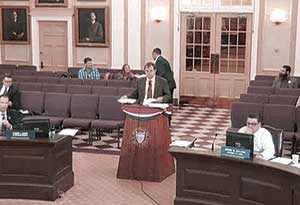
Director of Planning and Zoning George Proakis was on hand at the meeting to help clarify points relating to proposed green space and planning amendments.
By Jordan Deschenes
The Board of Aldermen discussed the current amended draft of the Union Square Zoning Ordinance last Thursday at the request of Mayor Curtatone. The draft was eventually referred to the Land Use Committee for recommendation. During the meeting, aldermen reviewed comments inserted by members of the Planning and Zoning department at-length.
“This draft should reflect the things we’ve discussed so far … but I would include the caveat that there are going to be more changes,” said Ward 6 Alderman Lance Davis, who is the Chairperson of the Land Use Committee.
“We’re not approving it, we’re amending the proposed amendment for those pages, but we will still need to be very careful as we reference it and look at both versions of this to make sure that, at the end of the day, we’re clear on what has and has not changed.”
Proposed green space and planning amendments
To facilitate the discussion, the Board called upon George Proakis, Director of the Department of Planning and Zoning, to help explain the amendments and inserted comments in the draft. Proakis himself wrote the majority of the comments.
Considerable changes were discussed in the “Development Planning” section of the document with regards to the specifics of commercial build-out and the minimum amount of greenery required in open spaces.
The draft currently reads that at least twenty-five percent of all proposed developments must contain open “civic” space. Additionally, fifty percent of civic space must be covered by tree canopy or “vegetative landscape.”
Certain aldermen were concerned with an amendment that they felt was not specific enough when defining what constituted as green space. Many city residents consider green space to be more than just “brick and mortar,” according to Alderman At-Large Mary Jo Rossetti.
Alderman Davis identified that there was no explicit requirement for “green stuff,” arguing that developers could include tree cover to meet the minimum requirement while still utilizing concrete. Ward 5 Alderman Niedergang added that the definition for “vegetative landscape” needed to be more restrictive with regards to the land use requirement, citing permitted materials such crushed stone and seashells.
According to Director Proakis, altering too many requirement percentages would affect the overall economic impact of the proposal, as the planned projects are interconnected. Proakis admitted that such negotiation is limited due to the fact that many of the projects are adding on to existing development.
The current master development plan for Union Square predicts that the project will be finished in conjunction with the opening of Union Square Station, with an estimated completion timeframe of around 20 years. Initially, residential development between Prospect Street and Somerville Avenue must be constructed as a requirement to “unlock” more development progress during the timeframe.
“It (green space) is an important item, yet our feeling is that it has been maximized to a point, and to increase beyond what’s in the ordinance today is going to start to impact program,” said Greg Karczewski, President of the Union Square Station Associates, the master development partner for the planned Union Square development project.
“The entire plan that’s been put together is about tradeoffs, and if you start to add more green space, then you start to limit the amount of development capacity in terms of what creates benefits, tax dollars, and housing.”
Community Benefits funding deadline
Union Square zoning has been prioritized this month to coincide with the May 31 deadline established by the state to submit an application for Community Benefits funding. Zoning overlay changes need to be approved by today in order for developers to be eligible to receive state Community Benefits funding.
“We’ve been given this deadline of May 31st, which I don’t consider to be a real ‘deadline,’ but that’s a whole other discussion,” said Alderman Niedergang.
“If the (Union Square) Covenant deal is broken, I certainly won’t be voting for anything that doesn’t have any community benefits in it,” said Ward 1 Alderman Matthew McLaughlin, in reference to the proposed Community Benefits Ordinance. “I’m not going to allow the covenant to dictate what we do, but I won’t be voting for anything that doesn’t have any sort of deal.”
The Board of Aldermen will hold a special meeting tonight at City Hall and is expected to move forward with both the zoning and Community Benefits ordinances.














Reader Comments